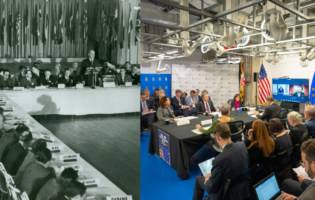The German Apprenticeship Model
Watch these clips from this panel from the AGI Annual Symposium:
Unfortunately Unqualified: The State of U.S. Jobs and Skills (4:56)
German-American Cooperation on Fostering U.S. Apprenticeship Programs (3:44)
Not Our Problem: Improving the German Apprenticeship Model (2:32)
The United States is desperately trying to reduce its unemployment rate. The domestic energy boom and low natural gas prices, together with competitive wage rates, could lead to a resurgence in manufacturing that could provide a great opportunity to increase middle-class wages, reduce income inequality, and expand social mobility. The bad news is, firms interested in investing in the United States are finding too few workers with the skills needed to achieve the productivity and quality required in today’s globally competitive industries.
While unemployment remains at 7.6 percent, about 600,000 jobs go unfilled because of a lack of skilled labor.1 Meanwhile, German companies’ top complaint about expanding operations in the United States is an inadequate number of skilled workers for intermediate-level technical occupations. The problems lie not with college-educated engineers or graduates with general bachelor’s degrees, but in the shortage of skilled machinists, welders, robotics programmers, and those who maintain equipment.
The central answer to the mismatch between jobs and employment is a 21st century apprenticeship program. In Austria, Germany, and Switzerland—countries with long histories of guilds and craftwork—55 to 70 percent of all young people enter apprenticeships.2 The United States’ academic-only strategy is ill-suited for a diverse population and for the multiple needs of the 21st century labor market. A robust apprenticeship system would ensure that the impending manufacturing expansion succeeds.
Most importantly, an expanded apprenticeship program could meet the needs of a competitive global economy at a time of budget austerity.
This panel will also look at the challenges facing Germany: Although Germany appears to be in a high-training, high-education equilibrium with their apprenticeship programs, the relationship between the supply of apprentice slots and demand from young people is highly sensitive to economic and technological change and to global competitive pressures on firms. In the last two decades, the pressures of globalization, and the growth of the knowledge economy have threatened the stability of the equilibrium between apprentices, employers and the government.
Panelists:
Peter Fischer, Head of Economic Affairs, Embassy of the Federal Republic of Germany to the U.S.
James Foti, Deputy Administrator, Office of Apprenticeship (ETA), U.S. Department of Labor
Sebastian Patta, Vice President of Human Resources, Volkswagen Group of America Chattanooga Operations
Moderator:
Stanley S. Litow
Vice President of Corporate Citizenship & Corporate Affairs, IBM
President, IBM Foundation








